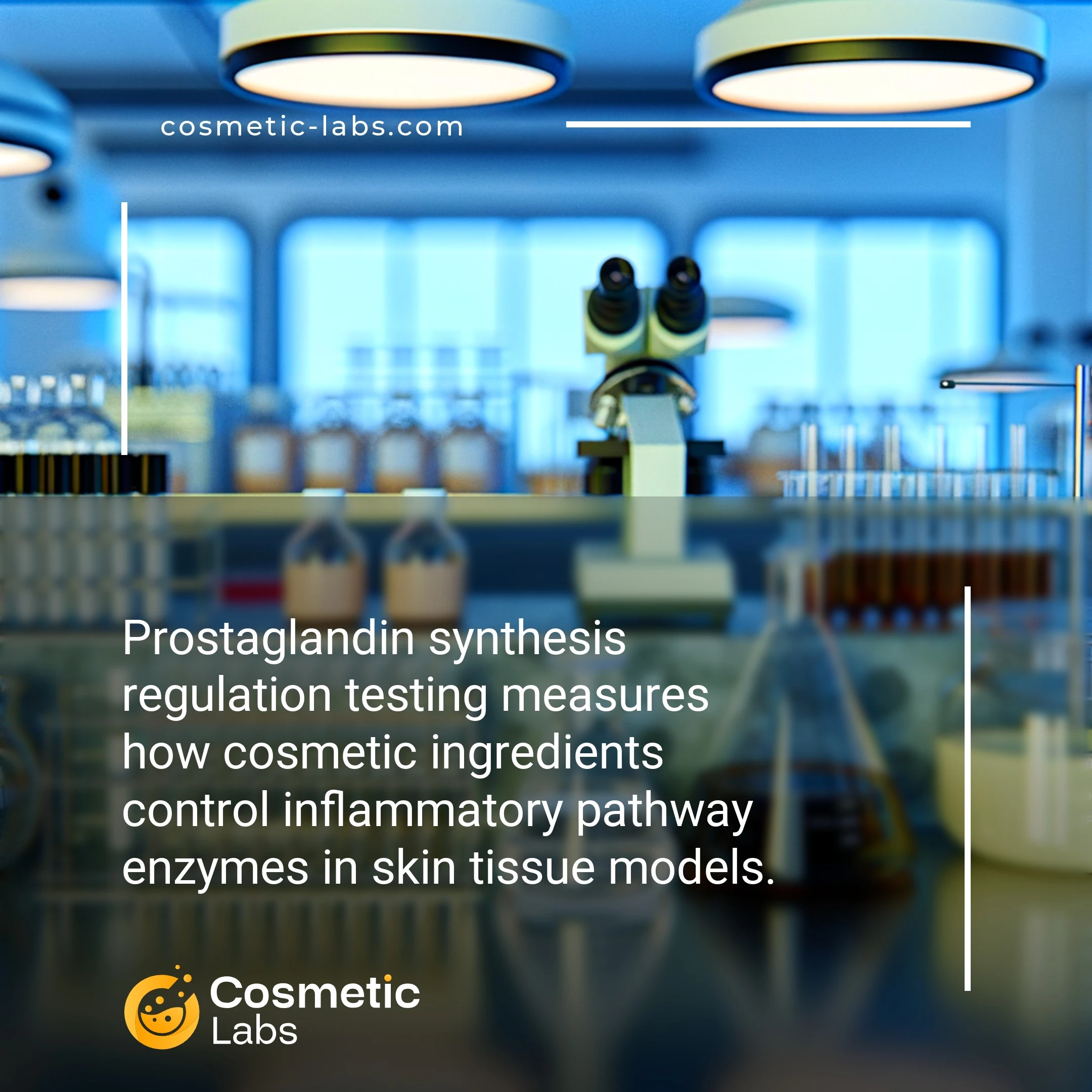Prostaglandin Testing Services for Anti-Inflammatory Cosmetics

What is Prostaglandin synthesis regulation?
Prostaglandin synthesis regulation testing measures how cosmetic ingredients modulate inflammatory pathways by controlling cyclooxygenase (COX) enzymes and lipid mediator production. Labs use cell-based assays with human keratinocytes to evaluate your formulation’s ability to reduce prostaglandin E2 levels, providing quantitative data on anti-inflammatory efficacy. This testing reveals whether your active ingredients can interrupt the inflammatory cascade at the molecular level, offering brands scientific validation for anti-redness and soothing claims.
Why do you need this service?
Cosmetic labs use prostaglandin pathway modulation testing to validate anti-inflammatory ingredients like niacinamide, ceramides, and botanical extracts before you launch sensitive skin formulations. This targeted approach helps brands demonstrate measurable inflammation reduction in preclinical studies, giving you the scientific backing needed for marketing claims about redness relief, barrier repair, and skin calming benefits.
Who provides Prostaglandin synthesis regulation services?
All cosmetic labs providing Prostaglandin synthesis regulation services
There is no company providing these services at the moment.
Prostaglandin Synthesis Regulation Testing for Anti-Inflammatory Cosmetics
Prostaglandin synthesis regulation testing measures how effectively cosmetic ingredients control inflammatory pathways in skin cells. Labs use these assays to validate anti-inflammatory claims for products targeting redness, irritation, and sensitive skin conditions.
Cyclooxygenase Enzyme Inhibition Assays
Testing facilities measure COX-1 and COX-2 enzyme activity to determine how ingredients block prostaglandin production. These enzymes convert arachidonic acid into inflammatory mediators that cause skin redness and swelling.
Standard protocols include:
- COX-1/COX-2 selectivity screening at multiple concentrations
- IC50 value determination for potency comparison
- Time-course studies to assess sustained inhibition
- Cell viability testing to rule out cytotoxic effects
Results help formulators optimize anti-inflammatory actives and establish effective use concentrations for product development.
Inflammatory Mediator Quantification
Labs quantify prostaglandin E2, leukotriene B4, and other inflammatory markers using ELISA or LC-MS methods. These measurements provide direct evidence of reduced inflammation in treated cell cultures.
Testing approaches include:
- Stimulated keratinocyte and fibroblast culture models
- Multi-analyte inflammatory panels for comprehensive profiling
- Dose-response curves to establish minimum effective concentrations
This data supports regulatory submissions and marketing claims for sensitive skin formulations. Connect with specialized cosmetic labs on our platform to access these inflammatory testing services for your product development needs.
Applications of Prostaglandin Synthesis Regulation Testing for Inflammatory Response Assessment
Cosmetic labs use prostaglandin synthesis regulation testing to evaluate how formulations modulate inflammatory pathways, providing brands with data-driven insights for anti-inflammatory product development.
Anti-Aging Formulation Development
Beauty brands developing anti-aging products rely on prostaglandin synthesis assays to measure how active ingredients affect cyclooxygenase (COX) and lipoxygenase (LOX) enzyme activity. Labs test compounds like curcumin, resveratrol, and botanical extracts against inflammatory markers including PGE2, PGF2α, and leukotriene B4.
Testing protocols measure inflammatory mediator reduction within 24-72 hours of treatment application. Results help formulators optimize concentrations and select synergistic ingredient combinations that deliver measurable anti-inflammatory benefits without compromising product stability.
Sensitive Skin Product Validation
Brands creating products for sensitive or reactive skin use prostaglandin pathway analysis to validate gentleness claims. Labs evaluate how formulations interact with arachidonic acid metabolism, measuring both immediate inflammatory responses and downstream prostaglandin production.
Testing includes dose-response curves for key ingredients and finished products. Labs quantify prostaglandin inhibition rates ranging from 20-80% depending on active concentration, providing concrete data for marketing claims and regulatory submissions.
| Testing Parameter | Measurement Method | Typical Results Timeline | Application Focus |
|---|---|---|---|
| COX-1/COX-2 Inhibition | Enzyme activity assay | 4-6 hours | Anti-inflammatory actives |
| PGE2 Production | ELISA quantification | 24-48 hours | Sensitive skin formulations |
| Leukotriene B4 Levels | Immunoassay detection | 12-24 hours | Acne and irritation products |
| Arachidonic Acid Metabolism | LC-MS/MS analysis | 48-72 hours | Comprehensive pathway mapping |
Connect with specialized cosmetic labs on our platform to access prostaglandin synthesis regulation testing services tailored to your product development needs.
